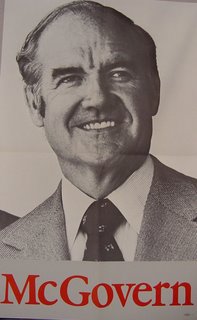McGovern

After he lost 49 out of 50 states to incumbent Richard Nixon in the disastrous 1972 Democratic campaign, and after the exposure of the abuses of power waged by Nixon and his crew in the Watergate affair led to numerous convictions and the resignation of Nixon himself, George McGovern wrote: "I have to live with the knowledge that, not only did I lose the election, but I lost it to the most discredited man ever to occupy the White House." He occupies a unique position in recent history as the electoral martyr in a not-so-fair fight, but one for whom no great feeling of passion is summoned. Respect, yes -- but not passion.
Born on this day in 1922 in Avon, South Dakota, McGovern was a World War II combat pilot who settled in as a professor of history and government at Dakota Wesleyan University, the earnest, serene, soft-spoken McGovern served briefly in Congress before John Kennedy appointed him director of the Food for Peace Program. The prestige from that stint contributed to his election to the Senate in 1962, where he focused on poverty issues (particularly as chairman of the Select Committee on "Unmet Basic Needs"). After the assassination of his friend Robert Kennedy just before the 1968 Democratic convention, McGovern waged a three-week candidacy for the nomination as a successor to Kennedy's Vietnam peace candidacy, but disappeared in the confusion which led to the nomination of Hubert Humphrey.
He seemed like a long-shot at the beginning of the 1972 campaign, with a young, close-to-the-ground campaign staff he capitalized on the wobbliness of Edmund Muskie's campaign, placing a convincing 2nd in New Hampshire (Muskie's own backyard) and sending Muskie to the showers soon afterward. After George Wallace was sidelined by a would-be assassin, only Humphrey stood by as a potential threat to McGovern's most improbable nomination, waging convention floor fights over credentials which, while unsuccessful in conquering McGovern, hobbled his hoped-for harmonious launch. McGovern's first choice for his running mate, Sen. Tom Eagleton, stumbled into controversy when he admitted to having undergone shock therapy for depression. After first guaranteeing his support for Eagleton ("1,000 percent"), McGovern coolly shrugged to the party leadership and chose Kennedy relative Sargent Shriver as Eagleton's replacement on the ticket.
The same capacity McGovern had for riding out stormy weather without panicking made him a colorless campaigner, however; coupled with the Republicans' success in tarring him as the ultra-liberal candidate of "amnesty, acid and abortion" (a refrain begun by his Democratic primary opponents) and a loss of confidence from his core supporters over his perceived waffling on the issue of ending the Vietnam War, he suffered a decisive defeat in November.
He lost reelection to the Senate in 1980 in the midst of the anti-Jimmy Carter backlash, and went back to teaching, until he surprised everyone by announcing yet another presidential candidacy in 1984. If the 1972 campaign seemed quixotic, his 1984 bid for the Democratic nomination was downright sisyphean: tooling around New Hampshire in a rented car with one volunteer staffer, running far behind his own wunderkind campaign manager from 1972, Gary Hart, McGovern nevertheless managed to survive on vapor for a few primaries. He stole some choice moments, coming on much as the same disengaged, slightly cranky Bodhisattva he was in 1972, as the only one of the candidates who seemed to have been guided by a moral compass and a sense of duty to humanity. Yet the effort was quickly forgotten.
In 1996, he wrote a moving reminiscence on the death of his daughter Terry, who struggled with alcoholism, and in 1998 President Clinton appointed him to the ambassador-rank position of UN representative to the Food and Agriculture Organzation in Rome. Perhaps as an indication of his "elder statesman" status, George W. Bush asked him to stay on in the position in 2001. Later that year, McGovern was appointed global ambassador on world hunger by the United Nations.
Labels: American Politicians, Presidential Campaigns, Watergate





0 Comments:
Post a Comment
Subscribe to Post Comments [Atom]
<< Home